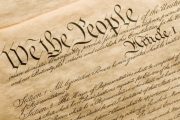By now, the broad strokes of the showdown in the Nevada desert between legacy cattle rancher Cliven Bundy (shown) and the federal government are readily discernible. For those needing an on-ramp to the issue, read this article written by The New American’s senior editor, William F. Jasper.
Most media coverage of the situation focuses on two claims by the Bureau of Land Management (BLM). First, that Bundy hasn’t paid fees to the federal government for his use of “public lands.” Second, that Bundy’s cattle (near 1,000 head) are threatening the habitat of the desert tortoise (never mind that the feds have been killing thousands of those “endangered” animals for years).
What has failed to be adequately explored are the key constitutional conflicts between the BLM’s tyrannical behavior and the power granted to the federal government in the Constitution.
First, a brief review of the historical debates on the issue of federal ownership of “public lands” is in order.
On September 5, 1787, the delegates to the Constitutional Convention in Philadelphia were wrapping up the nearly four months of deliberations. Within two weeks, the document would be signed and sent to state conventions for consideration. But first, there was the question of control the federal government would be authorized to exercise over “public land.”
Discussions centered on the provision of the Constitution known as the Enclave Clause — Article I, Section 8, Clause 17. As he had done so many times, Massachusetts delegate Elbridge Gerry rose to employ his impressive oratorical skill to build better fences separating the federal government from the states and the people.
Gerry contended that “this power [to exercise authority over “public land”] might be made use of to enslave any particular state by buying up its territory, and that the strongholds proposed would be a means of awing the state into an undue obedience to the general government.”
There is no better description of the despotism of the BLM than “awing the state into undue obedience to the general government.” The federal government — and most commentators — believe that the federal government is merely exercising its constitutional right to control “public lands.” Sure, these apologists admit, Bundy is suffering personal deprivation, but that’s the price we pay for “domestic tranquility.”
Our Founding Fathers knew better. As Senator Mike Lee (R-Utah) explained in regard to federal seizure of significant land in the mountain West:
Then, as now, we have a grave risk associated with the fact that when the federal government owns this much land, the federal government has this much power. This was on the minds of the delegates to the Convention of 1787, that one of the things they needed to protect against was the concentration of too much power in the hands of the few, especially the concentration of too much power within the federal government. They understood, and each of them had a mission to protect the sovereignty of their respective states. They understood that if Congress had too much power to simply buy up too much land in any one state, disproportionately in some states, the federal government would have too much influence within that state.
Unfortunately for the state of Nevada, its own state constitution is little more than a paean to the unfettered ferocity of the federal beast. Section 2 of the Nevada constitution reads:
No power exists in the people of this or any other State of the Federal Union to dissolve their connection therewith or perform any act tending to impair[,] subvert, or resist the Supreme Authority of the government of the United States. The Constitution of the United States confers full power on the Federal Government to maintain and Perpetuate its existance [sic], and whensoever any portion of the States, or people thereof attempt to secede from the Federal Union, or forcibly resist the Execution of its laws, the Federal Government may, by warrant of the Constitution, employ armed force in compelling obedience to its Authority.
Could there be a less constitutionally sound demarcation of the spheres of power of the states and the federal government? James Madison’s allotment of authority as set out in The Federalist, No. 45, was apparently not available to the drafters of the Silver State’s constitution. Madison wrote:
The powers delegated by the proposed Constitution to the federal government, are few and defined. Those which are to remain in the State governments are numerous and indefinite. The former will be exercised principally on external objects, as war, peace, negotiation, and foreign commerce; with which last the power of taxation will, for the most part, be connected. The powers reserved to the several States will extend to all the objects which, in the ordinary course of affairs, concern the lives, liberties, and properties of the people, and the internal order, improvement, and prosperity of the State.
Cliven Bundy’s family has lived on this land for nearly 140 years. The Bundys have settled and improved this property since Cliven’s ancestor accompanied Edward Bunker and a company of Church of Jesus Christ of Latter-day Saints members who settled on the Virgin River, a few miles west of the Nevada-Arizona border in 1877.
In nearly every way, Bundy’s life and liberty are connected inextricably to this property — property they have preemptive rights to and have worked for years before the federal government realized there was gold — black gold — in them thar hills.
The BLM makes millions by leasing land such as that worked by Cliven Bundy to energy companies dedicated to fracking operations. A 2007 map produced by the Nevada Bureau of Mines and Geology shows oil exploration being conducted on the land surrounding Bundy’s spread. Some drilling operations in the area are already successfully siphoning oil from the wells in Bundy’s backyard.
There’s more than federal lust for oil and mineral leases, though, at work against Cliven Bundy.
Nevada native Senator Harry Reid (D-Nev.) knows something about the tortoise and how important its survival is. When a millionaire donor to Reid needed the BLM to fudge the boundaries of the desert tortoise’s protected habitat so that he could build a billion-dollar real estate development, it was not as precious a natural resource as it is now.
That donor, Harvey Whittemore, was convicted last May of making illegal campaign contributions to Reid. A news report of the verdict revealed, “Prosecutors said Whittemore gave money to family members and employees in 2007 to make contributions he had promised to Reid while concealing himself as the true source to skirt campaign finance laws.”
Harry Reid has another ominous tie to the federal government’s attempt to seize Bundy’s land. Just days ago, the Senate confirmed Neil Kornze, former senior adviser to Senator Reid, to head the BLM.
Next, a crucial question that has until now not been asked is: Does the federal government (or any government) have the right to pass “laws” such as those being enforced against Cliven Bundy?
For an answer, I turn to The Law, by Frederic Bastiat:
What, then, is law? It is the collective organization of the individual right to lawful defense.
Each of us has a natural right — from God — to defend his person, his liberty, and his property. These are the three basic requirements of life, and the preservation of any one of them is completely dependent upon the preservation of the other two. For what are our faculties but the extension of our individuality? And what is property but an extension of our faculties? If every person has the right to defend even by force — his person, his liberty, and his property, then it follows that a group of men have the right to organize and support a common force to protect these rights constantly. Thus the principle of collective right — its reason for existing, its lawfulness — is based on individual right. And the common force that protects this collective right cannot logically have any other purpose or any other mission than that for which it acts as a substitute.
Thus, since an individual cannot lawfully use force against the person, liberty, or property of another individual, then the common force — for the same reason — cannot lawfully be used to destroy the person, liberty, or property of individuals or groups.
Such a perversion of force would be, in both cases, contrary to our premise. Force has been given to us to defend our own individual rights. Who will dare to say that force has been given to us to destroy the equal rights of our brothers? Since no individual acting separately can lawfully use force to destroy the rights of others, does it not logically follow that the same principle also applies to the common force that is nothing more than the organized combination of the individual forces?
If this is true, then nothing can be more evident than this: The law is the organization of the natural right of lawful defense. It is the substitution of a common force for individual forces. And this common force is to do only what the individual forces have a natural and lawful right to do: to protect persons, liberties, and properties; to maintain the right of each, and to cause justice to reign over us all.
Finally, there is one constitutional consideration that needs to be made. Despite the Nevada constitution’s capitulation to supreme federal authority (authority, remember, that does not exist in the Constitution), there is another article in that document that it could be argued supersedes the other article’s cession of state and popular sovereignty.
Section 1, titled “Inalienable Rights,” of the Nevada constitution reads:
All men are by Nature free and equal and have certain inalienable rights among which are those of enjoying and defending life and liberty; Acquiring, Possessing and Protecting property and pursuing and obtaining safety and happiness.
As of today, Cliven Bundy is not free and his God-given and inalienable right to use and protect land he and his family have had preemptive rights to for generations is being abridged. If nothing is done to defend his enjoyment of his rights, then soon the plutocrats on the Potomac will not recognize any restrictions on their power and they will seize any land, using any excuse, and will enforce those seizures with weapons.
Joe A. Wolverton, II, J.D. is a correspondent for The New American and travels nationwide speaking on nullification, the Second Amendment, the surveillance state, and other constitutional issues. Follow him on Twitter @TNAJoeWolverton and he can be reached at [email protected].
Related article:




